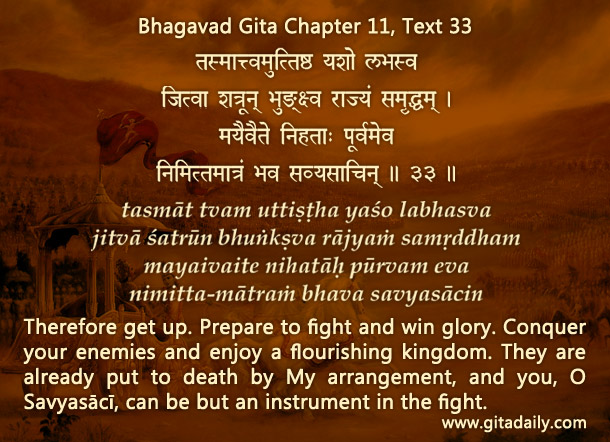When we cook something, say, sweet rice, we use ingredients such as rice, sugar, milk, camphor – and God. No, God is not one of the ingredients; his grace pervades the whole cooking process. It manifests as the provision of the ingredients, the availability of gas for cooking, the presence of our own intelligence to cook properly, and so forth. Thus, he is the cause underlying the many causes that contribute to the cooking.
The Bhagavad-gita (11.33) states that Arjuna’s opponents are already killed by Krishna’s arrangement. Actually, the original Sanskrit doesn’t use the word arrangement – it simply states mayaiva “by me [Krishna], certainly.” This attribution is intriguing because in the ensuing war Krishna didn’t kill a single warrior; he was a non-combatant throughout. What, then, does the Gita declaration that Krishna was the slayer mean? It refers to Krishna’s empowering Arjuna, Bhima and the various Pandava warriors, who acted as his instruments. It refers also to Krishna’s orchestrating various circumstances to ensure that the right things happened at the right time. Thus, he was the cause that underlay all the causes of the Pandavas’ victory.
Later, the Gita (18.14) mentions daiva (destiny) as one of the five causes that contribute to the successful completion of any action. Within Sankhya metaphysics, daiva refers not to God’s direct intervention, but to his will manifested through the gods incharge of cosmic administration.
Of course, God, if he so desires, can intervene directly– as he does when he performs miracles. But he isn’t a show-off magician who needlessly violates the laws of nature; he usually manifests his will through the orderly working of nature.
To thus understand that God is not a factor in the functioning of nature but is its foundation is to appreciate his transcendence.
To know more about this verse, please click on the image
Explanation of article:
Podcast:


Sashtang Pranam Prabhujee. Most Wonderful explanation. Profound Dhanyavad